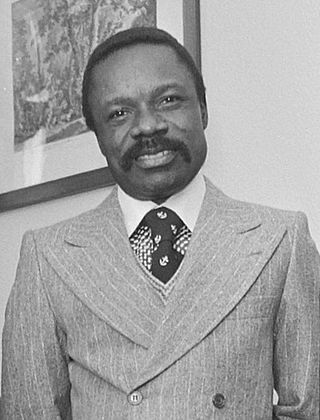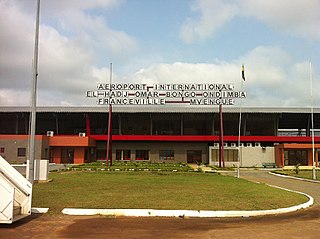| |||||
| Decades: | |||||
|---|---|---|---|---|---|
| See also: | |||||
Events in the year 1993 in Gabon .
| |||||
| Decades: | |||||
|---|---|---|---|---|---|
| See also: | |||||
Events in the year 1993 in Gabon .

Gabon, officially the Gabonese Republic, is a country on the Atlantic coast of Central Africa, on the equator, bordered by Equatorial Guinea to the northwest, Cameroon to the north, the Republic of the Congo on the east and south, and the Gulf of Guinea to the west. It has an area of 270,000 square kilometres (100,000 sq mi) and a population of 2.3 million people. There are coastal plains, mountains, and a savanna in the east. Libreville is the country's capital and largest city.
Little is known of the history of Gabon before European contact. Bantu migrants settled the area beginning in the 14th century. Portuguese explorers and traders arrived in the area in the late 15th century. The coast subsequently became a centre of the transatlantic slave trade with European slave traders arriving to the region in the 16th century. In 1839 and 1841, France established a protectorate over the coast. In 1849, captives released from a captured slave ship founded Libreville. In 1862–1887, France expanded its control including the interior of the state, and took full sovereignty. In 1910 Gabon became part of French Equatorial Africa and in 1960, Gabon became independent.

The politics of Gabon takes place in a framework of a republic whereby the president of Gabon is head of state and in effect, also the head of government, since he appoints the prime minister and his cabinet. The government is divided into three branches: the executive headed by the prime minister, the legislative that is formed by the two chambers of parliament, and the judicial branch. The judicial branch is technically independent and equal to the two other branches, although in practice, since its judges are appointed by the president, it is beholden to the same president. Since independence the party system is dominated by the conservative Gabonese Democratic Party.

The president of Gabon is the head of state of Gabon. A total of three people have served as president since the post was formed in 1960.

Omar Bongo Ondimba was a Gabonese politician who was the second president of Gabon for almost 42 years, from 1967 until his death in 2009. Bongo was promoted to key positions as a young official under Gabon's first President Léon M'ba in the 1960s, before being elected vice-president in his own right in 1966. In 1967, he succeeded M'ba to become the country's second president, upon the latter's death.

The Gabonese Democratic Party is a political party in Gabon. It was the dominant political party in Gabonese politics from 1961 until 2023, when it was deposed in a coup d'état against President Ali Bongo Ondimba. It was also the sole legal party between 1968 and 1990.

Ali Bongo Ondimba, also known as Ali Bongo and Ali Ben Bongo, is a Gabonese former politician who was the third president of Gabon from 2009 to 2023. He is a member of the Gabonese Democratic Party. He is the son of Omar Bongo, who was president of Gabon from 1967 until his death in 2009. During his father's presidency, he was Minister of Foreign Affairs from 1989 to 1991, represented Bongoville as a deputy in the National Assembly from 1991 to 1999, and was the Minister of Defense from 1999 to 2009. After his father's death, he won the 2009 Gabonese presidential election. He was reelected in 2016, in elections marred by numerous irregularities, arrests, human rights violations, and post-election protests and violence.
Stade Omar Bongo is a multi-purpose stadium in Libreville, Gabon. It is currently used mostly for football matches. It serves as the home ground of FC 105 Libreville. The stadium has a capacity of 41,000 and is named after Omar Bongo, who was President of Gabon from 1967 to 2009.

Gabon is a Christian majority nation, with around ten percent of the population being Muslim according to 2020 figures. Almost all of them follow Sunni Islam. Due to the secular nature of the country's constitution, Muslims are free to proselytize and build places of worship in the country.

M'Vengue El Hadj Omar Bongo Ondimba International Airport is an airport serving the city of Franceville, Haut-Ogooué Province, Gabon. The airport is 16 kilometres (9.9 mi) west of the city, near the village of M'Vengue.
Omar Bongo University is a public university which was founded as the National University of Gabon in 1970. It was renamed in honor of President Omar Bongo in 1978. It is based in Libreville, and was the country's first university. It is Gabon's largest university and around 30,000 students are enrolled there (2020).

Christianity is the predominant religion in Gabon, with significant minorities of the adherents of Islam and traditional faiths.

Franco-Gabonese relations are the current and historical relations between France and Gabon. Both nations are members of the Organisation internationale de la Francophonie and the United Nations.

The Minister for Foreign Affairs of Gabon is a government minister in charge of the Ministry for Foreign Affairs of Gabon, responsible for conducting foreign relations of the country.

Édith Lucie Bongo Ondimba was the First Lady of Gabon as the wife of President Omar Bongo from 1989 to 2009.

The second President of Gabon, Omar Bongo, died in Spain on June 8, 2009, after having suffered from colorectal cancer. A month of mourning and state funeral, spanning June 11 to 18th, followed.
The African nation of Gabon has had human inhabitants for perhaps 400,000 years. Bantu peoples settled here from the 11th century. The coastline first became known to Europeans through Portuguese and Dutch sailors. Colonised by the French in the 19th century, Gabon became independent in 1960.
The cinema of Gabon has had an uneven history. Though President Omar Bongo and his wife, Josephine Bongo, encouraged filmmaking in the 1970s, there was a 20-year hiatus until filmmaking started to grow again in the new millennium.
Events in the year 2009 in Gabon.
Capital punishment in Gabon was officially abolished for all crimes in 2010. Gabon's last execution took place in 1985. Prior to abolition, Gabon was classified as de facto abolitionist, or "abolitionist in practice," due to the length of time since their last execution.